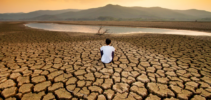The result of these discussions, which have already proven difficult on other occasions, must be presented in a document that will summarize the main dangers and the measures necessary to combat them.
ADVERTISING
This study, which is expected to be published on March 20, will contain the latest discoveries on climate change, the impact of major meteorological events, such as droughts and floods, and scientific proposals to contain the emission of greenhouse gases.
@curtonews O #ParisAgreement is an international treaty that has one main objective: to reduce global warming. O Curto tell you more about it! 🌎
♬ original sound – Curto News
The time has come to “accelerate the exit from fossil fuels”, called for UN Secretary-General, António Guterres.
Six reports, thousands of pages
Since its creation in 1988, the IPCC, an intergovernmental body made up of hundreds of scientists, has produced six reports, each divided into three parts and thousands of pages long, compiling scientific observations from around the world.
ADVERTISING
The IPCC summary for environmental policymakers is important because it is the tool with which governments can impose dramatic changes in key sectors such as energy and construction.
It will also be a key document for the upcoming climate change conference (COP28) in Dubai in December.
“The facts demonstrate that we are not doing enough to respond to this crisis. Current emissions continue to be the highest in human history”, warns Stephanie Roe, an expert at the WWF organization and contributor to the IPCC report. “We are far from our goal, and the window to limit warming to +1,5°C is closing quickly,” she explains.
ADVERTISING
This target of a ceiling of up to +1,5°C was one of the key points of the Paris Agreement of 2015.
Since the end of the 1,1th century, the planet's average temperature has risen by more than XNUMX°C, which, according to experts, implies changes in the climate, the scope of which we are still discovering.
The final synthesis of this sixth report will consist of two parts. The first will be a condensation of around 50 pages from the three main parts of the last report, published between 2021 and 2022. These three parts presented the physical evidence of climate change, its impacts and mitigation measures.
ADVERTISING
In parallel, the IPCC released three special reports on the consequences, on the oceans and cryosphere and also on dry land.
“The synthesis report is important, because it will be the last work of the IPCC for a few years,” said Oliver Geden, one of the main authors and an expert at the German Institute for International Security Affairs, in an interview with AFP.
(To AFP)
Read also






